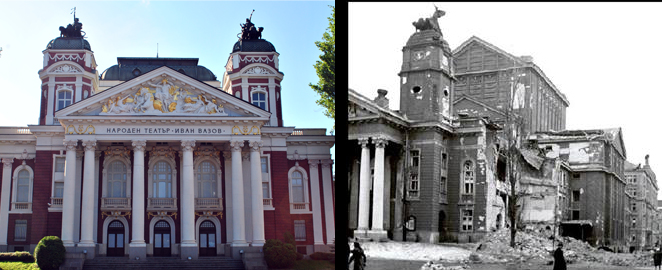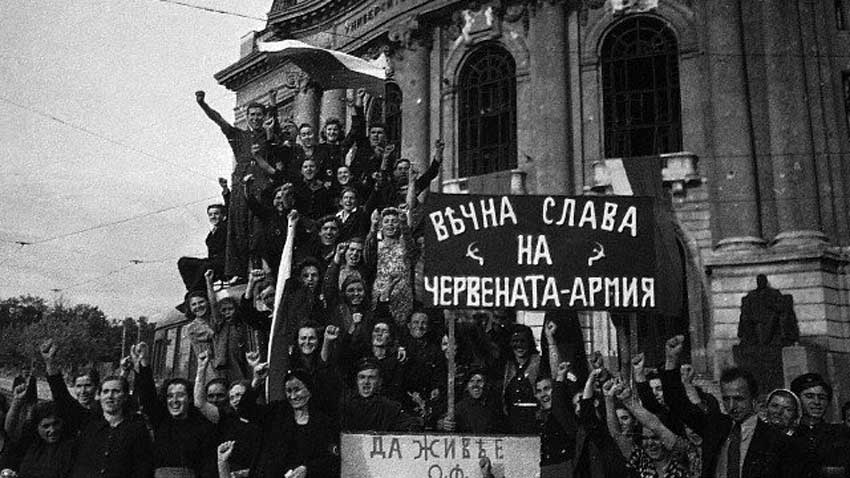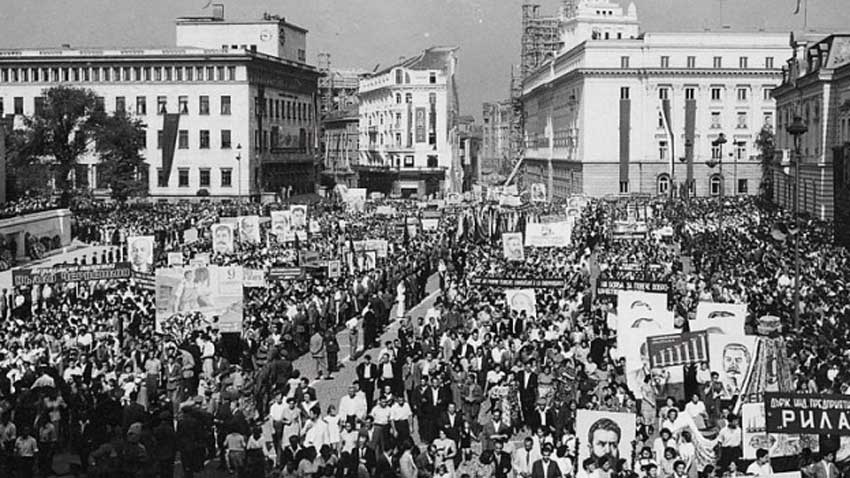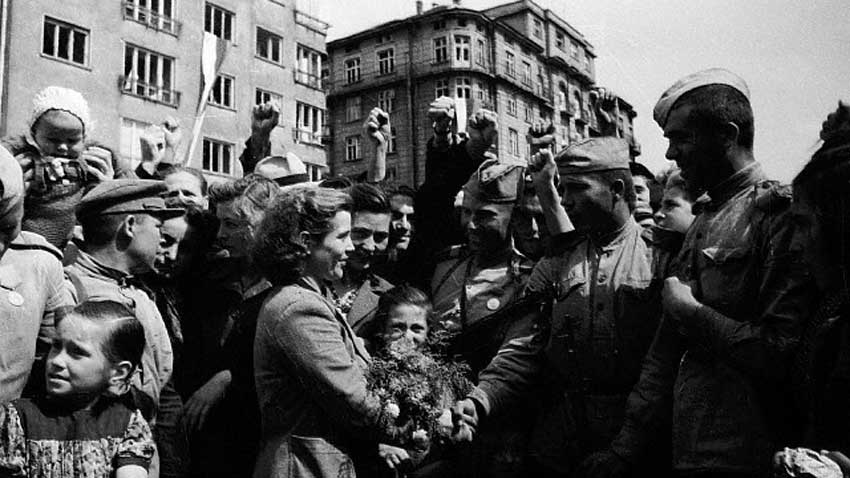 When, under duress from Hitler, at the end of 1941 Bulgaria declared symbolic war on Great Britain and USA, no one could have known that two years later it would turn into bitter reality. On 10 January, 1944 a formation of some 200 American aircraft conducted a massive air raid on Sofia. That ushered in the year 1944, a turning point in the country’s history. The bombings continued throughout the spring. Besides the out and out war with London and Washington, by the end of the summer of 1944, Bulgaria’s relations with Germany had deteriorated and the country was in urgent need of a truce. On August 26 under threat of the advance of the Red Army in Romania, the government of Ivan Bagryanov made a proclamation of neutrality. On that same day the Central Committee of the Bulgarian Workers’ Party (communists) issued instructions for taking up arms and seizing power. On September 2, a government was formed by the opposition Bulgarian Agrarian National Union “Vrabcha 1” with Konstantin Mouraviev as Prime Minister which continued the peace negotiations with all sides and stated it was for “democratic reform”. Even though negotiations were being held at a summit level, the USSR declared war on Bulgaria. On 8 September, the Red Army set foot on Bulgarian territory and occupied a number of towns.
When, under duress from Hitler, at the end of 1941 Bulgaria declared symbolic war on Great Britain and USA, no one could have known that two years later it would turn into bitter reality. On 10 January, 1944 a formation of some 200 American aircraft conducted a massive air raid on Sofia. That ushered in the year 1944, a turning point in the country’s history. The bombings continued throughout the spring. Besides the out and out war with London and Washington, by the end of the summer of 1944, Bulgaria’s relations with Germany had deteriorated and the country was in urgent need of a truce. On August 26 under threat of the advance of the Red Army in Romania, the government of Ivan Bagryanov made a proclamation of neutrality. On that same day the Central Committee of the Bulgarian Workers’ Party (communists) issued instructions for taking up arms and seizing power. On September 2, a government was formed by the opposition Bulgarian Agrarian National Union “Vrabcha 1” with Konstantin Mouraviev as Prime Minister which continued the peace negotiations with all sides and stated it was for “democratic reform”. Even though negotiations were being held at a summit level, the USSR declared war on Bulgaria. On 8 September, the Red Army set foot on Bulgarian territory and occupied a number of towns.

In the meantime the Central Committee of the Bulgarian Workers Party and the supreme command of the People’s Revolutionary Liberation Army (the pro-Soviet guerillas) set in motion a plan for an uprising aimed at seizing full control of the country. On the night before September 9, when the Soviet invasion had begun, the officers from the political group Zveno seized crucial facilities in Sofia: The Ministry of War and the Ministry of the Interior, the Central Post Office, the Telegraph Office, the radio. Konstantin Mouraviev’s government was overthrown and an anti-Nazi and pro-Soviet government of the Fatherland Front was installed, with Prime Minister Kimon Georgiev. We go back to that morning with the help of Dr. Petar Dertliev (a prominent politician, social-democrat, subjected to repressions by the communist regime). His recollections are part of the Bulgarian National Radio’s Golden Fund:
“Early in the morning we heard the voice of Kimon Georgiev, he was almost pathetic. A voice that can evoke just about anything but respect. We heard the proclamation and made for the city centre at once. We went to the square and people started to throng from all sides. To be honest, Bulgarians know how to give a warm welcome. They were desolate when the Tsar died, elated when the Germans came, and now they were elated – again. There are always people that will be ecstatic at times like these.”

That was how the date 9 September, 1944 came to be a turning point in the country’s history, a date that brought immense changes to Bulgarian society. On 10 September, the police were disbanded and a People’s Militia created, consisting primarily of guerilla fighters. What followed was a rising tide of violence by communist groups against their opponents. On 12 September, the government issued a decree for the arrest of the cabinet ministers from the 1941-1944 period, as well as of members of parliament and army officers, lending legitimacy to the widespread arrests across the country. Over the three months that followed thousands were killed – intellectuals, representatives of the administration and of the economic elite. According to unofficial data, 20,000 – 40,000 were killed without trial or sentence.
“Why did the victory of this anti-fascist uprising have to be blown out of proportion? Note that the atrocities and the killing only started after September 12, 1944, i.e. the wrath of the people did not spill out spontaneously. Because if someone had killed my brother, I would be the first to go out and seek him out. Pretence had to be made of some sort of gigantic act of heroism, of battles taking place so as to justify the massacre of thousands. And the killing was not confined to people who had perpetrated real crimes; all potential opponents were killed – social democrats, agrarians and not just people with right-of-centre beliefs. Someone gave the order, I cannot say who. And after 12 September, people were going missing and executions started on a massive scale,” Dr. Petar Dertliev said in 1990.

On October 28, 1944 an armistice was signed in Moscow, by force of which Bulgaria officially joined the Allies and was obligated to turn its troops over to Soviet command against Germany. In point of fact, as of 9 September the Bulgarian soldiers had been fighting against the Germans. Bulgaria had to give over to the Soviet troops fuel, food and anything else they needed. In practical terms, the armistice lent legitimacy to the status quo – a country under Soviet Army occupation. It has been ascertained that in the 1944-1947 period, the Soviet Army occupation and the upkeep of the Soviet troops cost over BGN 133 billion. That is the picture of life in Bulgaria in the ill-fated year of 1944, a year that laid the foundations of the totalitarian regime in Bulgaria.
English version: Milena Daynova
Photos: archive
He was the most handsome pianist of his time. Elegant, proud and unreachable, he looked as if he was born with a tailcoat in Sofia in 1929. This is how Berlin newspaper "Die Welt" described Alexis Weissenberg. Born in Sofia, the..
“I believe that even talented playwright Stanislav Stratiev who wrote the role in the emblematic movie Band With No Name especially for Velko Kunev, would have found it hard to find words of solace if he were here with us now. Velko..
„What is happening around the world, concerns us, and the more we turn a blind eye to that it concerns us, the more we get encaged in our domestic problems and narrow our horizon, the more inadequate we become in making..

+359 2 9336 661
